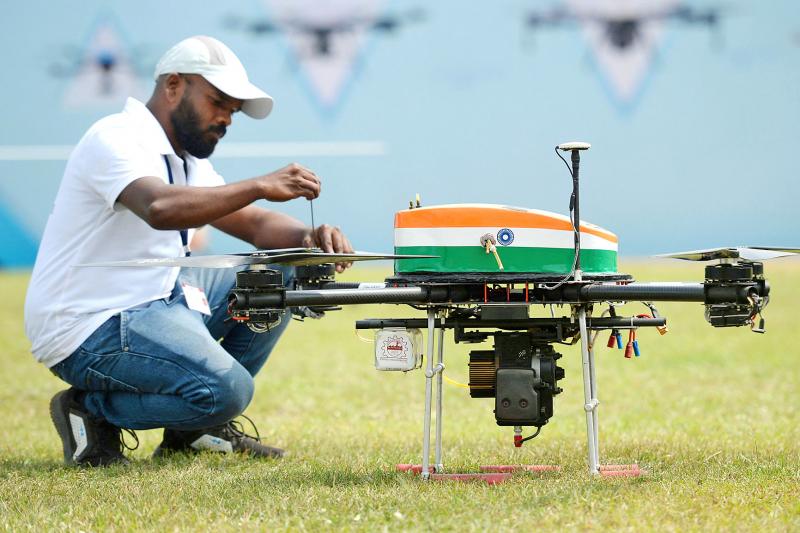India has banned the import of drones, a move that effectively blocks an emerging market for China’s SZ DJI Technology Co (大疆創新), the world’s top drone maker, and encourages a nascent local industry to increase production.
Import of some drone components is to be allowed without approval, the Indian Directorate-General of Foreign Trade said in an order late on Wednesday.
Drones used for research and development, defense and security purposes would be exempt from the ban, the government said.

Photo: AFP
Amid the continuing disputes between China and US, drones have taken center stage as concerns surface that Shenzhen, China-based DJI might be relaying some sensitive data to Chinese intelligence agencies on everything from critical infrastructure, such as bridges and dams, to personal information, such as heart rates and facial recognition.
India last year relaxed rules on the use of drones to make it easier to acquire licenses and allowed heavier payloads, so the devices can potentially be used as uncrewed flying taxis.
India is to offer 1.2 billion rupees (US$16 million) of incentives for drone makers under Indian Prime Minister Narendra Modi’s US$20 billion plan to lure the world’s biggest brands to make their products in India and export them to the world.
Rattanindia Enterprises Ltd, a local drone maker, said that India’s move would help to make the nation a drone manufacturing hub.
The new rules would allow better efficiency in supply-chain operations, inventory and fund management, the company said in a statement yesterday.
The pandemic has intensified a shift to automated delivery for meals, groceries, medical supplies and other essentials, boosting the drone industry.
Autonomous-vehicle firms, delivery start-ups and drone operators have touted the benefits of contactless systems.

AI TALENT: No financial details were released about the deal, in which top Groq executives, including its CEO, would join Nvidia to help advance the technology Nvidia Corp has agreed to a licensing deal with artificial intelligence (AI) start-up Groq, furthering its investments in companies connected to the AI boom and gaining the right to add a new type of technology to its products. The world’s largest publicly traded company has paid for the right to use Groq’s technology and is to integrate its chip design into future products. Some of the start-up’s executives are leaving to join Nvidia to help with that effort, the companies said. Groq would continue as an independent company with a new chief executive, it said on Wednesday in a post on its Web

RESPONSE: The Japanese Ministry of Finance might have to intervene in the currency markets should the yen keep weakening toward the 160 level against the US dollar Japan’s chief currency official yesterday sent a warning on recent foreign exchange moves, after the yen weakened against the US dollar following Friday last week’s Bank of Japan (BOJ) decision. “We’re seeing one-directional, sudden moves especially after last week’s monetary policy meeting, so I’m deeply concerned,” Japanese Vice Finance Minister for International Affairs Atsushi Mimura told reporters. “We’d like to take appropriate responses against excessive moves.” The central bank on Friday raised its benchmark interest rate to the highest in 30 years, but Bank of Japan Governor Kazuo Ueda chose to keep his options open rather than bolster the yen,

Even as the US is embarked on a bitter rivalry with China over the deployment of artificial intelligence (AI), Chinese technology is quietly making inroads into the US market. Despite considerable geopolitical tensions, Chinese open-source AI models are winning over a growing number of programmers and companies in the US. These are different from the closed generative AI models that have become household names — ChatGPT-maker OpenAI or Google’s Gemini — whose inner workings are fiercely protected. In contrast, “open” models offered by many Chinese rivals, from Alibaba (阿里巴巴) to DeepSeek (深度求索), allow programmers to customize parts of the software to suit their

Global server shipments are expected to surge to 15 million units next year, from 4 million units this year, with artificial intelligence (AI) servers accounting for about 30 percent, driven by massive capital spending by major cloud service providers, the Market Intelligence and Consulting Institute (MIC) said on Thursday last week. Major cloud service providers — including Google’s parent company Alphabet Inc, Microsoft Corp, Amazon.com Inc and Meta Platforms Inc — are projected to budget US$450 million for capital expenditure next year, up from US$400 million this year, MIC ICT [information and communications technology] Industry Research Center director Edward Lin